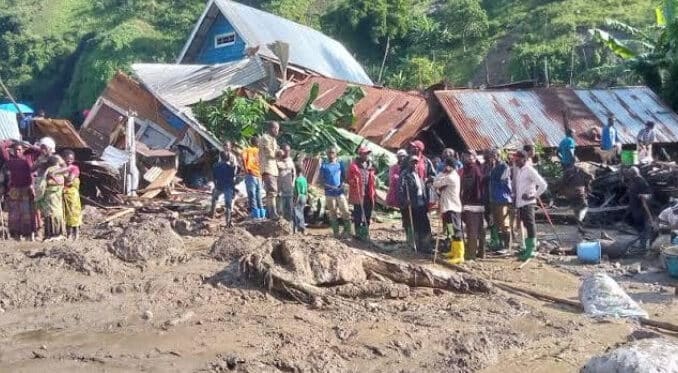
Local residents make their way through a seriously damaged road following heavy rains that caused floods and landslides, on the outskirts of Kinshasa, Democratic Republic of Congo, Dec 14 2022. Photo: Reuters/Justin Makangara/Referential photo.

Orinoco Tribune – News and opinion pieces about Venezuela and beyond
From Venezuela and made by Venezuelan Chavistas

Local residents make their way through a seriously damaged road following heavy rains that caused floods and landslides, on the outskirts of Kinshasa, Democratic Republic of Congo, Dec 14 2022. Photo: Reuters/Justin Makangara/Referential photo.
In Bushushu, South Kivu Province, Democratic Republic of Congo, on Thursday, May 4, under heavy rain, the Nyamukubi and Chishova rivers burst their banks, causing major mudslides and landslides. In the affected areas, the damage was enormous. Entire villages were devastated by the waters and the assessments are still provisional.
#URGENT: Quand l'inondation de Kalehe est en cours. Plusieurs sources locales à Bisunzu, près de Rubaya indiquent qu'un éboulement de terre a touché cette région ce lundi 08 mai. Le bilan n'est pas encore connu mais c'est près d'une dizaine de creuseurs artisanaux. #RDC pic.twitter.com/tmhdZXQ6bc
— Akilimali S. Chomachoma (@akilimalichoma_) May 8, 2023
On Saturday, the territory’s administrator put the number of bodies found at 203. On Sunday, he mentioned at least 394, 120 of whom were found floating on the lake near Idjwi island, the others found in Nyamukubi and in the neighbouring village of Bushushu. More than 200 bodies were buried on Saturday, May 6, in Bushushu and Nyamukubi.

At least 400 people are reported dead, according to a local official, and many are missing. The civil society of Kalehe says that nearly 4,500 people are still missing, as chances of finding survivors are diminishing.
“The situation is bitter! We came to bury our brothers while the state should anticipate things by creating a special commission for the prevention of natural disasters. Whether in Uvira, Kamituga or here in Kalehe, these events are repeated, so a commission is needed,” says Benjamin Kasindi, head of the political party Alliance des Nationalistes pour un Congo Émergent in South Kivu, who traveled to bring aid to the victims.
If the US Told Rwanda and Uganda To Get Out of Congo, the War Would End (Interview)
Teams are still digging for bodies with shovels and their hands. They wrap the bodies in blankets or sheets before burying them in mass graves. On the shore of the lake float pieces of wood, metal sheets, furniture and other materials carried by the raging rivers. Young people are trying to salvage what they can from the sunken houses: Metal sheets, metal structures, boards, etc. The Red Cross and the government are continuing to register families who have lost their loved ones, as well as other victims.
Initial assistance in the form of medicines, tarpaulins, and food from the provincial government of South Kivu arrived on the spot on Saturday. This aid is still insufficient in according to the administrator of Kalehe territory, Archimède Karebwa. He continues to call on the central government and other humanitarians to intervene because the situation is so deplorable.
(Toward Freedom) by Akilimali Saleh Chomachoma
blaorinoco 5.15.23 13:35 PM EST
You must be logged in to post a comment.